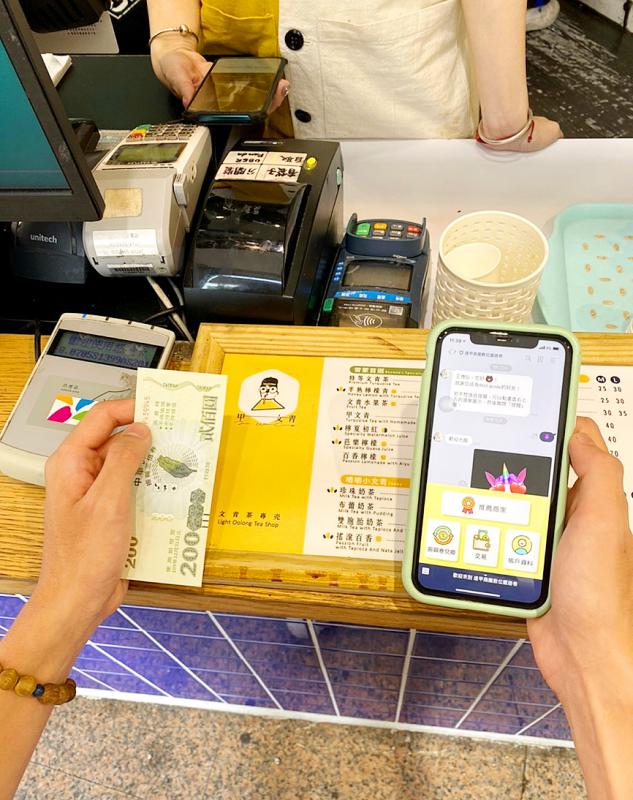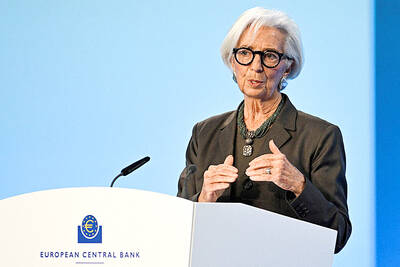The Chung-Hua Institution for Economic Research (CIER, 中華經濟研究院) yesterday raised its forecast for Taiwan’s GDP growth this year to 1.77 percent, from a previous estimate of 1.03 percent, as private consumption might stage a comeback fueled by the government’s Triple Stimulus Vouchers.
It is the first upgrade to Taiwan’s GDP growth forecast since COVID-19 broke out in late January, prompting research institutes at home and abroad to cut projections, citing concerns over tepid consumer spending and exports.
The latest forecast suggests a 72 percent increase from three months earlier, backed by a V-shaped recovery in tourism, despite the continued absence of foreign tourists and business travelers.

Photo: Chang Ching-ya, Taipei Times
“The stimulus vouchers of NT$3,000 per person might boost GDP growth by 0.44 percentage points,” meaning the institute would have to raise the growth rate anyhow, CIER president Chang Chuang-chang (張傳章) said.
Taiwan’s quick control of the virus outbreak has enabled people to lead a normal life with minimal social distancing requirements, the economist said.
Private consumption, which fell 1.58 percent in the first quarter and likely shrank 0.38 percent last quarter, might finish the year with a 0.87 percent increase, Chang said.
The pickup could increase to 1.33 percent if the vouchers help compound the wealth effect, he said.
The absence of lockdowns in Taiwan allows local companies, especially electronics suppliers, to benefit from order transfers and reap a boom in demand for devices used in remote working and learning arrangements.
Demand for laptops, data centers, servers and TVs remains strong this quarter, as confirmed cases escalate in many parts of the world, Taiwanese firms said, adding that unabated 5G spending also lends support to their business.
Taipei-based CIER said that overall exports would take a hit amid global economic downturns, but external demand might still make positive contributions due to a faster decline in imports.
Travel deficits might also taper off this year, as Taiwanese outspend foreign tourists on overseas vacations, government data showed.
Private investment, a main growth driver last year, might increase 0.25 percent this year, as firms turn cautious about expansion amid uncertainty, CIER said.
The government has stepped up investment and expenditure to bail out stressed companies and strengthen infrastructure, it said.
The institute expects unemployment to hover above 4 percent last quarter and this quarter due to the influx of new college graduates, and expects it to ease to 3.97 percent next quarter as the economy improves.
The New Taiwan dollar might trade at an average of NT$30.11 against the greenback this year, appreciating 2.66 percent from last year, as the US economy flounders, it said.

European Central Bank (ECB) President Christine Lagarde is expected to step down from her role before her eight-year term ends in October next year, the Financial Times reported. Lagarde wants to leave before the French presidential election in April next year, which would allow French President Emmanuel Macron and German Chancellor Friedrich Merz to find her replacement together, the report said, citing an unidentified person familiar with her thoughts on the matter. It is not clear yet when she might exit, the report said. “President Lagarde is totally focused on her mission and has not taken any decision regarding the end of

French President Emmanuel Macron told a global artificial intelligence (AI) summit in India yesterday he was determined to ensure safe oversight of the fast-evolving technology. The EU has led the way for global regulation with its Artificial Intelligence Act, which was adopted in 2024 and is coming into force in phases. “We are determined to continue to shape the rules of the game... with our allies such as India,” Macron said in New Delhi. “Europe is not blindly focused on regulation — Europe is a space for innovation and investment, but it is a safe space.” The AI Impact Summit is the fourth

CONFUSION: Taiwan, Japan and other big exporters are cautiously monitoring the situation, while analysts said more Trump responses ate likely after his loss in court US trading partners in Asia started weighing fresh uncertainties yesterday after President Donald Trump vowed to impose a new tariff on imports, hours after the Supreme Court struck down many of the sweeping levies he used to launch a global trade war. The court’s ruling invalidated a number of tariffs that the Trump administration had imposed on Asian export powerhouses from China and South Korea to Japan and Taiwan, the world’s largest chip maker and a key player in tech supply chains. Within hours, Trump said he would impose a new 10 percent duty on US imports from all countries starting on

STRATEGIC ALLIANCE: The initiative is aimed at protecting semiconductor supply chain resilience to reduce dependence on China-dominated manufacturing hubs India yesterday joined a US-led initiative to strengthen technology cooperation among strategic allies in a move that underscores the nations’ warming ties after a brief strain over New Delhi’s unabated purchase of discounted Russian oil. The decision aligns India closely with Washington’s efforts to build secure supply chains for semiconductors, advanced manufacturing and critical technologies at a time when geopolitical competition with China is intensifying. It also signals a reset in relations following friction over energy trade and tariffs. Nations that have joined the Pax Silica framework include Japan, South Korea, the UK and Israel. “Pax Silica will be a group of nations